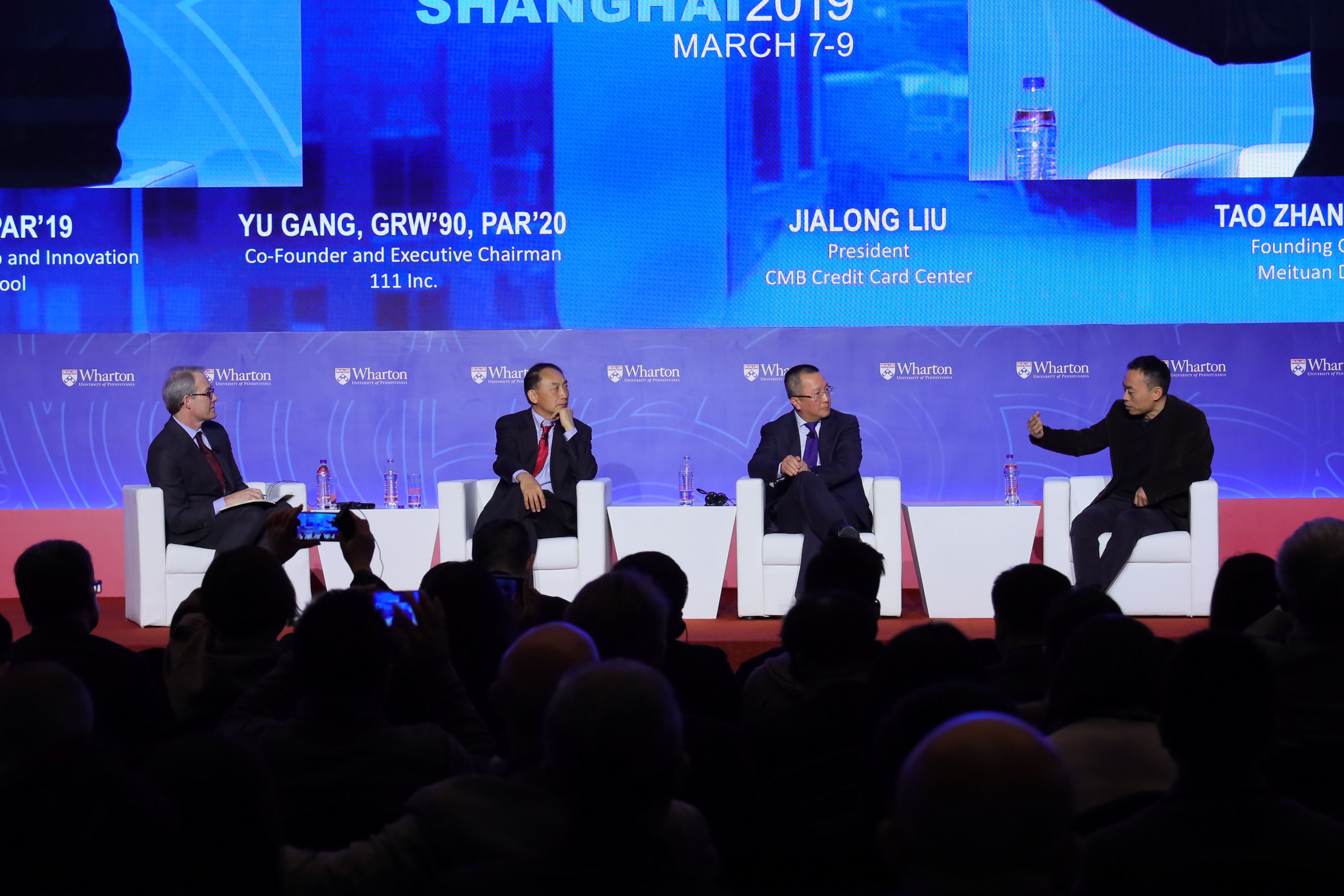Quick Takes on Big Ideas
Sessions you need to know about
One of the hallmarks of any Wharton Global Forum is the auspicious nature of the conversations. Though the keynotes and fireside chats were long-planned, speakers seized the moment and took on the timeliest issues and headlines in business, geopolitics, and economics. Here is a snapshot of some of the key takeaways and perspectives from the Forum.
What Does It Take to Operate a Start-Up Successfully?
Good Entrepreneurs, Of Course

Speakers
- Yu Gang, GRW’90, PAR’20, Co-Founder and Executive Chairman, 111 Inc.
- Karl Ulrich, PAR’19, Vice Dean of Entrepreneurship and Innovation, The Wharton School
- Tao Zhang, WG’02, Founding Chairman, Meituan Dianping
- Jialong Liu, President, CMB Credit Card Center
- Z. John Zhang, Tsai Wan-Tsai Professor, Professor of Marketing and Director, Penn Wharton China Center, The Wharton School
In their keynote address at the Wharton Global Forum in Shanghai, Yu Gang and fellow speakers explored the relationship between entrepreneurship and innovative technology.
As a co-founder of a leading digital healthcare platform in China called 111, Inc., Yu Gang is aware of how technology has positively impacted entrepreneurship – especially in recent times. “I think the U.S. is more tolerant of encouraging the start-up spirit than China. In China, the big giants either copy business models or acquire companies,” he said, adding that he is in favor of China adopting more anti-monopoly policies as large corporations often acquire other companies, which prevents entrepreneurs from entering the start-up scene.
Yu Gang has witnessed an evolution in the maturity of business students he taught in China; 15 years ago, many favored a family-business operating model whereas today young entrepreneurs care more about compliance, IP, and innovation.
And while there are funds available to help companies grow, President of CMB Credit Card Center Jialong Liu said the search for good entrepreneurs to spearhead growth is more important in today’s market.
Data’s Relevance in Business

Speakers
- Tony Cai, Daniel H. Silberberg Professor of Statistics, Vice Dean for China Initiatives, The Wharton School
- Kenny Lam, W’96, Group President, Noah Holdings Ltd.
- Jun Yao, Head of Data Science and Analytics Department, WeBank
- Hannah Qiu, Executive Committee Member, OneConnect Financial Technology, Co-General Manager, Ping An Group
Kenny Lam, W’96, lauded Wharton for its efforts to combine business and analytics, noting that data scientists and other tech-focused practitioners are increasingly encouraged to join wealth management firms as their knowledge is especially useful in today’s data-driven society.
Jun Yao and Hannah Qiu held contrasting viewpoints. In Yao’s view, we currently have a lack of data, and companies must invest in data infrastructure to digitize businesses before analytics can make an impact. On the other hand, Hannah Qiu maintained that we currently have too much data. “We talk about data, but we need to talk about good quality data,” Qiu said. “We have data. The challenge is how to use the data.” Lam agreed that the manner in which data is cleansed is directly correlated to data’s usefulness.
The Next Wave of Global Disruption and China’s Role

Speakers
- Raj Beri, WG’07, Head, Uber Eats APAC
- Richard Ji, WG’03, Managing Partner and Chief Investment Officer, All-Stars Investment Ltd.
- Catherine Leung, W’90, PAR’22, Co-Founder and General Partner, MizMaa Ventures
- Leo Wong, WG’12, Managing Director, Asia, RGAX
According to Leo Wong, attention span has decreased as technology has advanced. In the age of television, attention span was 30 seconds. With smartphones, the current attention span is 6.5 seconds. In order to compensate for this, app titles that grab people’s attention are the ones that are most successful. A battle for data has also heated up as there is a growing recognition that consumers value data and its power and potential.
Catherine Leung asked Wong which entrepreneur he would most like to have dinner with. “Any one of my CEOs who has just failed,” he said. “That is when you have the most reflection and insight about yourself.”
 ASK A QUESTION
ASK A QUESTION